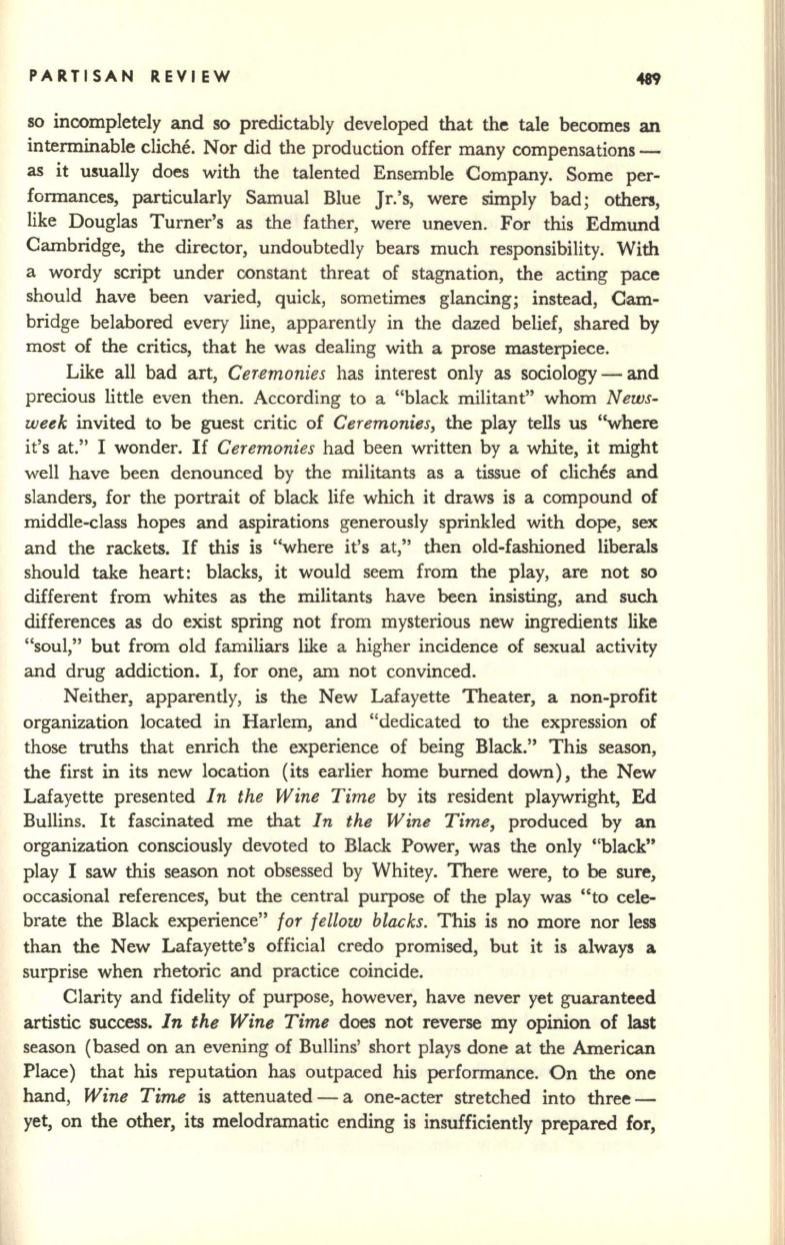
PARTISAN REVI EW
so incompletely and so predictably developed that the tale becomes an
interminable cliche. Nor did the production offer many compensations–
as it usually does with the talented Ensemble Company. Some per–
formances, particularly Samual Blue Jr.'s, were simply bad; others,
like Douglas Turner's as the father, were uneven. For this Edmund
Cambridge, the director, undoubtedly bears much responsibility. With
a wordy script under constant threat of stagnation, the acting pace
should have been varied, quick, sometimes glancing; instead, Cam–
bridge belabored every line, apparently in the dazed belief, shared by
most of the critics, that he was dealing with a prose masterpiece.
Like all bad art,
Ceremonies
has interest only as sociology - and
precious little even then. According to a "black militant" whom
News–
week
invited to be guest critic of
Ceremonies,
the play tells us "where
it's at." I wonder.
If
Ceremonies
had been written by a white, it might
well have been denounced by the militants as a tissue of cliches and
slanders, for the portrait of black life which it draws is a compound of
middle-class hopes and aspirations generously sprinkled with dope, sex
and the rackets.
If
this is "where it's at," then old-fashioned liberals
should take heart: blacks, it would seem from the play, are not so
different from whites as the militants have been insisting, and such
differences as do exist spring not from mysterious new ingredients like
"soul," but from old familiars like a higher incidence of sexual activity
and drug addiction. I, for one, am not convinced.
Neither, apparently, is the New Lafayette Theater, a non-profit
organization located in Harlem, and "dedicated to the expression of
those truths that enrich the experience of being Black." This season,
the first in its new location (its earlier home burned down), the New
Lafayette presented
In the Wine Time
by its resident playwright, Ed
Bullins. It fascinated me that
In the Wine Time,
produced by an
organization consciously devoted to Black Power, was the only "black"
play I saw this season not obsessed by Whitey. There were, to be sure,
occasional references, but the central purpose of the play was "to cele–
brate the Black experience"
for fellow blacks.
This is no more nor less
than the New Lafayette's official credo promised, but it is always a
surprise when rhetoric and practice coincide.
Clarity and fidelity of purpose, however, have never yet guaranteed
artistic success.
In the Wine Time
does not reverse my opinion of last
season (based on an evening of Bullins' short plays done at the American
Place) that his reputation
has
outpaced his performance. On the one
hand,
Wine Time
is attenuated - a one-acter stretched into three–
yet, on the other, its melodramatic ending is insufficiently prepared for,


